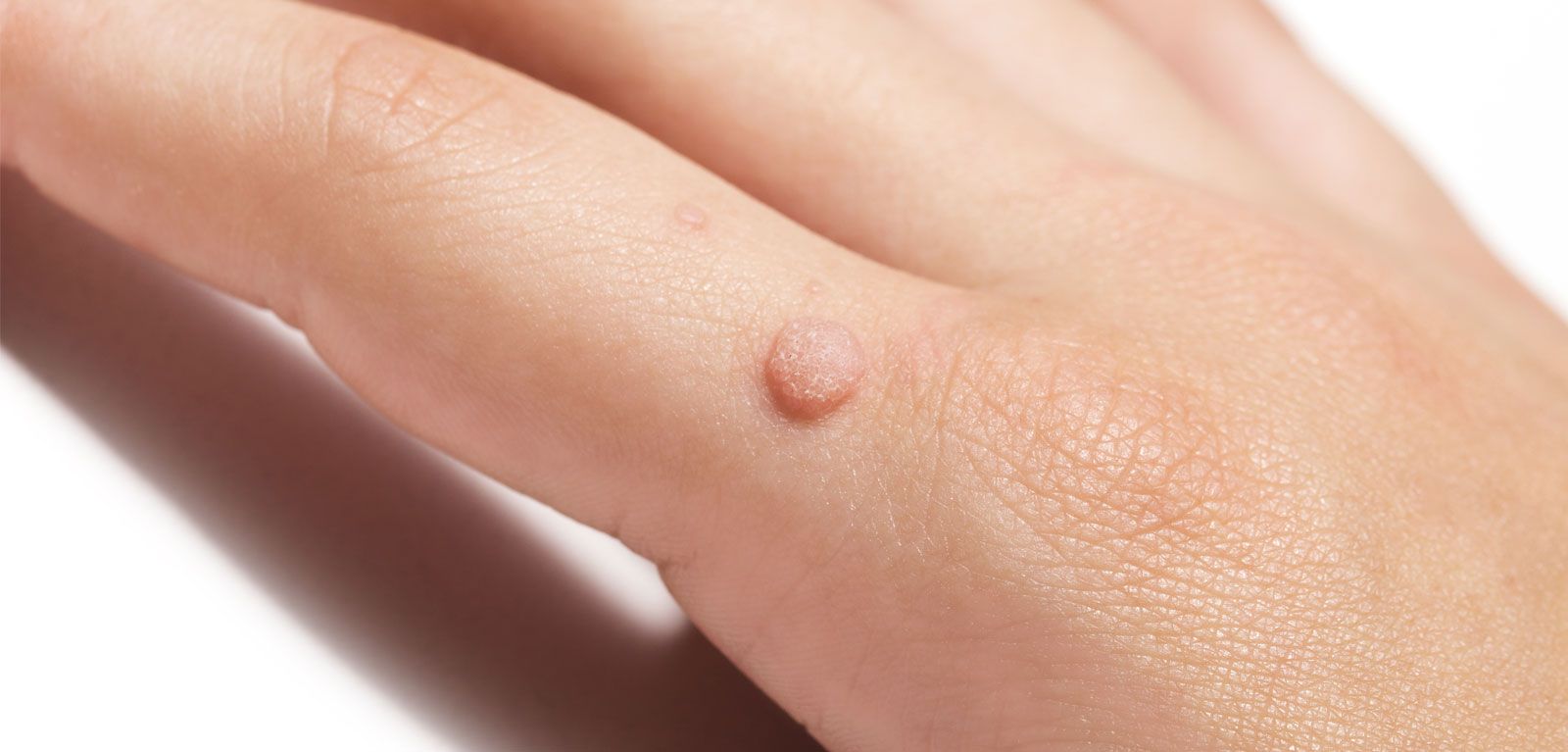Warts.

Overview
Warts are small, fleshy growths. They’re classified as an infection on the top layer of your skin, or epidermis. Warts
are very common and can reside anywhere on your body. It’s likely that most individuals develop at least one
common wart in their lifetime, generally on their hands. However, although everyone is at risk for developing a wart,
some individuals are more prone to developing these growths through the HPV virus. Most warts are harmless, but
the virus that causes warts is contagious and can be spread by direct contact with others.
Cause
Warts are caused by viruses in the human papillomavirus, or HPV, family. HPV is a group of over 350 viruses that can
cause different types of warts and skin lesions. Many HPV infections cause no symptoms and over 90% will clear
spontaneously within two years with no long-lasting consequence. Meaning, someone can have the HPV virus in their
system, come in contact with you, and end up giving you a wart through that HPV virus. Warts are contagious and can
spread by skin-to-skin contact, particularly if there are small tears or abrasions on the skin. It is also possible, but less
likely, to get HPV by contact with contaminated objects or surfaces, such as a shared razor or locker room floor.
Symptoms
Warts may develop anywhere on the body, including the bottom of the feet, palm of the hands, fingers, and genitals.
- Warts can be unsightly and grow to a significant size or in clusters
- Most are flesh-colored, although some come in various shades of white, pink, yellow, or brown.
- Typically painless, pain can sometimes occur when pressure is placed on them
- Presents as small raised bumps on the surface of the skin.
- Warts have a hard, keratinous surface
- Tiny red or black dots are visible in the wart
Treatments
Warts can be extremely difficult to treat and will often recur (return).To determine which treatment is right for you,
we recommend visiting a dermatologist to first determine which type of wart you have. Different warts respond to
different dermatological treatments, so it’s important to classify your wart before selecting a treatment option.
Topical therapies
Injectables
- Intralesional vitamin D injections
- Intralesional immunotherapy
- Bleomycin injections
Procedures
- Electrodesiccation and curettage
- Cryotherapy
- Pulsed dye laser destruction of feeding blood vessels
- Photodynamic therapy
- Laser vaporization

Home care / DIY care
-
Avoid foods that may flare acne, carbohydrate-rich foods, such as bread, doughnuts and chips.
-
Cover the wart with an adhesive bandage to prevent picking.
-
Grooming with care- Don't brush, comb, clip or shave in the areas that have warts
-
Don't use tools like a nail file or nail clipper on both your warts and on unaffected skin
-
Avoid biting your fingernails- Nibbling the skin around the fingernails opens the door for the entry of the virus.
-
Wash your hands carefully after touching the wart or around it.
-
Keep personal use tools separate.
-
Keep hands dry- Warts thrive in moist environment. Keeping hands dry will reduce the chances of occurrence of the warts.
FAQs
Are warts dangerous?
No, warts are not dangerous. They’re considered to be benign, meaning they’re non-cancerous. However, just
because they don’t pose a threat to your health, doesn’t mean you’ll want to leave your wart where it is. Many
patients wish to remove their wart because of aesthetic reasons, as the wart may be located in an area visible to the
public.
Are warts contagious?
Warts are extremely contagious. Warts, or rather HPV viruses, are easily spread through either skin-on-skin contact
or through direct contact with an object used by a person with the virus. You can come in contact with this virus
anywhere—on a door knob, a dirty pencil, your shopping cart, even money.
Are warts harmful if not removed?
If left untreated, it is possible for warts to spread and for the virus that causes warts to be passed to another person.
Do warts get bigger?
A wart might get bigger, new warts may appear, or you could give them to someone else.
Can warts be cancerous?
Warts are common skin growths. They are not cancer. And they don't turn into cancer. They are caused by a virus
called human papillomavirus (HPV)
How can I reduce the risk of getting warts and spreading them?
It’s always good to maintain good hygiene by avoiding direct skin to skin contact with someone who has warts. If you
already have them, to reduce the risk of more lesions and spread avoid scratching your warts, biting nails or sucking
fingers where they are present.
best natural results
Elara has expertise in technological advances & their suitability, and adaptability to different subjects.
We strive to treat our patients with high quality affordable & excellent Skin and laser treatments. You will get that natural touch of treatment that you will hardly get anywhere with us.
We strive to treat our patients with high quality affordable & excellent Skin and laser treatments. You will get that natural touch of treatment that you will hardly get anywhere with us.
